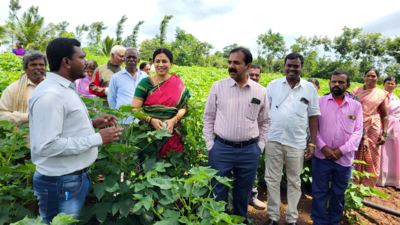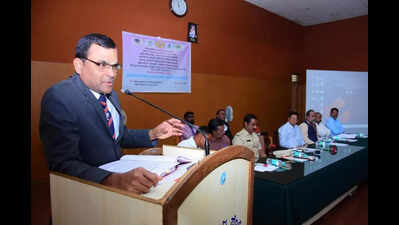Tribal farmers embrace climate-smart agriculture and safe crop protection measures with ICAR–UAS Bangalore | Mysuru News

MYSURU: Over 100 tribal farmers from Basavanagiri Haadi and Sollepura villages in H.D. Kote taluk are emerging as role models in climate-smart and safe sustainable agriculture. This achievement is part of two key initiatives—“Ensuring safe use of pesticide for healthy livelihood of tribal farmers during crop protection operations” and “Adoption of climate-smart integrated crop systems to improve the livelihood of ST population through field demonstrations, input supply and improved technology dissemination to mitigate the effects of climate change.”The projects are being implemented by the University of Agricultural Sciences (UAS), Bangalore, with funding from the Indian Council for Agricultural Research (ICAR), New Delhi, and the Skill Development Centre (SDC), UAS Bangalore, under the Tribal Sub-Plan (TSP).A field demonstration held on July 29 showcased live implementation of climate-resilient agricultural technologies and safe pesticide practices. The demo covered 50 acres of cotton, 75 acres of sorghum, and 100 acres of vegetable and fruit crops, all cultivated by tribal farmers trained at GKVK, UAS Bangalore.Speaking on the occasion, UAS Vice Chancellor Dr. S.V. Suresha said, “Climate change poses serious challenges to agriculture. These must be met with new crop varieties and advanced technologies, which our university is introducing through such projects.” He also emphasized the importance of safe pesticide use, warning that misuse can harm both life and the environment by contaminating natural resources and leaving harmful residues.Given that many of the participating tribal farmers are first-generation agriculturists with less than ten years of experience, the training they received proved critical. Farmers attended a five-day intensive course at the Farmers Training Institute (FTI), UAS Bangalore, before applying the techniques in their fields.Each farmer received essential inputs—cotton and sorghum seeds, fertilizers, pesticide sprayers, tarpaulins, bio-fungicides, and personal protective equipment. The visible success of their harvests was also credited to timely field advice and interventions by Dr. Manjula (Plant Pathologist) and Dr. Somshekar (Agronomist).“Farmers have successfully grown their crops by implementing the technologies provided during the training,” said Dr. Nagaratna, Director of the PPMC Cell. Dr. Shivaram, Director of Research, highlighted the importance of adjusting sowing windows and cropping patterns based on current rainfall trends.The field day served as a platform for demonstrating and disseminating climate-resilient and safety-conscious agricultural practices among tribal communities, reinforcing the success and replicability of the model.





